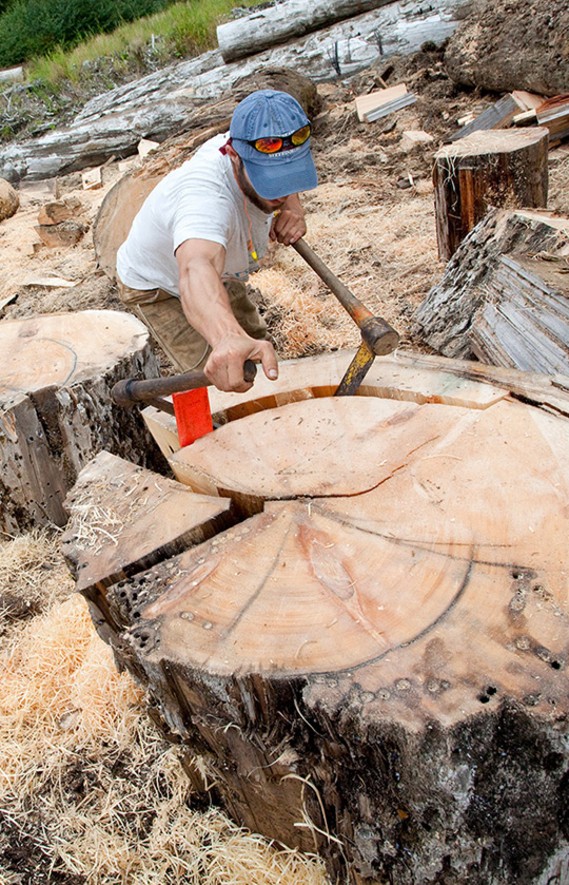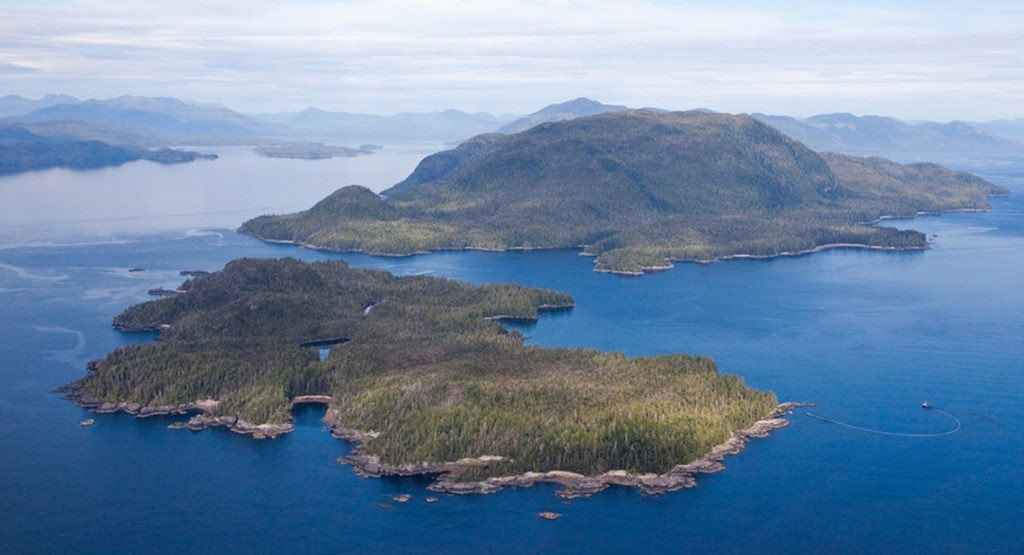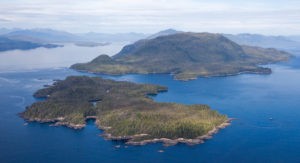Sitka—the majestic sound of everyone’s favorite guitar top
Bedell wood manager Angela Christensen travels to the Tongass National Forest
Angela Christensen has stood alone in the Tongass National Forest, looking up, arms outstretched, accepting the chilly rain; honoring its wisdom, letting its mystery seep into her bones.
Her first trip to Craig, an idyllic fishing village located a floatplane’s trip from Ketchikan, itself sitting on Alaska’s legendary Inside Passage, was something of an epiphany.
Subsequent visits to the region have kept her filled, fueled even, with that initial sense of wonder.
She’s watched in reverie as bald eagles flew overhead, commanding all attention. She’s communed with black porpoises as they swam alongside her kayak. And she’s been reminded, firsthand, that whales are one of Mother Nature’s most astonishing expressions of life.
“It’s just amazing. It’s beautiful, beautiful country,” she says of the awe-inspiring Tongass, which, at 17 million acres, is America’s largest National Forest and one of the world’s major carbon sinks.
Christensen leads wood management and product development for Bedell. At some point in the creation of your favorite instrument, she’s had contact with the natural materials that make it magnificent.
It’s important to Christensen, just as it is to Bedell owner Tom Bedell, to see first hand where the wood comes from for Bedell guitars, and to ensure the sustainable practices that will keep the forests alive for future generations while providing inspiring instruments for us to play today.
No clear-cut woods are used in any Bedell guitars.
Unfortunately, the Tongass, a tourism magnet, has not always been safe from such practices. Thousands of epic old growth trees have gone for paper pulp, furniture and firewood, threatening habitat for salmon and bears, as well as for surviving original communities.
Bedell sources Sitka Spruce—for bracing and crisp, clear-sounding tops—from the Tongass, where many of the trees have stood for centuries, growing over 200 feet tall, bearing witness to history, change and progress.
Sitka has long been one of the most ubiquitous of musical tonewoods, providing the basis not only for guitars, but also for enormous piano soundboards and the finest violin tops.
When Christensen first landed in Craig, in 2007, it was to meet with Annette and Brent Cole of Alaska Specialty Woods, which had begun, in 1996, according to the company’s own history, as a “one chainsaw operation.” At the time of Christensen’s initial visit, the couple as working out of a single-wide trailer and an improvised 20’x40’ lean-to sawmill and drying shed, situated right by the bay.
Christensen, already experienced in such matters, helped the duo refine its grading system and its methods of cutting Sitka to appropriate guitar specifications. Now, with their grown children long working in the business beside them, the Coles have become a premier supplier of tonewoods to the entire global musical instrument industry.
Along the way, in early 2016, the family lost virtually everything they owned in a tragic fire, which they have recovered from remarkably. Luckily, much of their existing Sitka stock was, by then, due to ASW’s growth, berthed in a separate storage facility.
“These were people honestly living off the land,” Christensen says. “They caught their own fish and hunted their own food; they smoked it and packed it to provide for the family. They did this for their livelihood, just how they’d always done it, living very simply. To see them go through that crisis was heartbreaking.”
Fortunately, at that point the Cole Family was already excavating for a new factory, with over 15,000 feet of dry space, A little over fifteen years after starting the business, the new facility cut its first soundboard in May 2015.
“Thankfully,” Christensen says, “it became an opportunity for them.”
She chose the Coles because of that very connection to place, at one with the forest and the sea; and because they are dedicated to ethical, sustainable practices, while also offering the very best quality tonewoods.
Alaska Specialty Woods is deeply aware of the importance of the Tongass and is careful to do all it can to preserve its health and majesty by selectively salvaging dead trees, removing windthrown trunks and reclaiming old wood, like that from left-behind log float decks. ASW removes such salvage, under permit, lifting logs out with a helicopter, then transporting them to the yard lot by barge.
According to the company’s website, “we now source 100 percent of our raw material from only salvaged old-growth timber, and have resolved to promote an ethical stewardship policy throughout the scope of our business.”
The topwoods from Alaska Specialty Woods now arrive as already dried, matched sets that have been split and sawn on site in Craig. Billets, broken down from larger cants, provide material for braces, which are created in Bend and hand voiced on select instruments.
Christensen, who worked at virtually every task in Bend prior to becoming chief designer, loves that Sitka is both “pretty friendly” to work with on the bench, and “consistent” in its delightful tonal qualities.
As the most familiar face of the American acoustic guitar, it’s not bad to look at, either.
“I love how it looks silky, how it shimmers when it gets finished,” she glows.
Not surprisingly, Christensen can’t wait to get back to the Tongass.
“You can hear so many things in the woods, from birds to insects to just the foliage whispering. It’s a rainforest, so it’s always wet, very wet, and just teeming with life. You can feel it. You can hear it. You smell it. Being around these trees that have lived so long, there’s a real energy about it. There’s a spiritual connection there, you know?”
“The Coles have a commitment,” Christensen says. “It would be much easier for them to get logs elsewhere.”



